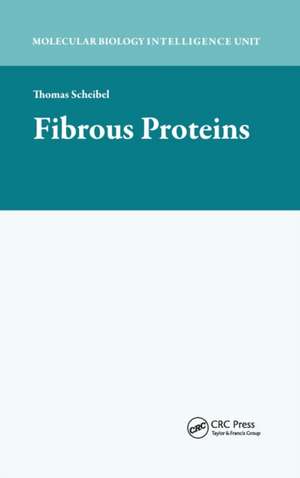Fibrous Proteins
Autor Thomas Scheibelen Limba Engleză Hardback – 21 oct 2008
Preț: 941.87 lei
Preț vechi: 1148.63 lei
-18% Nou
Puncte Express: 1413
Preț estimativ în valută:
180.24€ • 187.11$ • 150.30£
180.24€ • 187.11$ • 150.30£
Carte tipărită la comandă
Livrare economică 22 martie-05 aprilie
Preluare comenzi: 021 569.72.76
Specificații
ISBN-13: 9781587063169
ISBN-10: 1587063166
Pagini: 152
Ilustrații: 53 black & white illustrations
Dimensiuni: 152 x 229 mm
Greutate: 0.34 kg
Ediția:1
Editura: CRC Press
Colecția CRC Press
ISBN-10: 1587063166
Pagini: 152
Ilustrații: 53 black & white illustrations
Dimensiuni: 152 x 229 mm
Greutate: 0.34 kg
Ediția:1
Editura: CRC Press
Colecția CRC Press
Cuprins
Preface 1. Amyloid Fibrils Abnormal Protein Assembly 2. Vertebrate Collagens—Structures, Functions and Biomedical Applications 3. Short-Order Tendons: Liquid Crystal Mesophases, Metal- Complexation and Protein Gradients in the Externalized Collagens of Mussel Byssal Threads 4. The Formation of Fibrin Clots 5. Structure, Function and Assembly of Flagellar Axial Proteins 6. Keratin Intermediate Filaments: Similarities and Differences with Other Members of the IF Family 7. Tubulin and the Dynamic, Multifunctional Microtubules It Forms 8. Silks Produced by Insect Labial Glands 9. The Elaborate Structure of Spider Silk: Structure and Function of a Natural High Performance Fiber
Notă biografică
Thomas Scheibel is Professor for Biomaterials at the Faculty of Applied Science at the Universität Bayreuth, Germany. Main research interests include fibrous proteins such as spider silks and mussel collagens. He gained several prestigious awards including an “Innovation by Nature” award of the German M inistry of Science and Education in 2007. He is further one of 10 recipients of the 2006 innovation tribute of the Bavarian prime minister. He received his Diploma of biochemistry, Dr. rer. nat. from the Universität Regensburg, Germany and his Habilitation from the Technische Universität München, Germany.
Descriere
Fibrous Proteins will give an overview over some of the most important fibrous proteins including amyloids, collagens, fibrin, flagella, intermediate filaments, microtubules, silks concerning structure and function and possible applications as biomaterials
